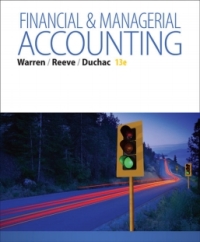Entries for bad debt expense under the direct write-off and allowance OBJ. 5 methods The following selected
Question:
Entries for bad debt expense under the direct write-off and allowance OBJ. 5 methods The following selected transactions were taken from the records of Shipway Company for the first year of its operations ending December 31, 2016:
Apr. 13. Wrote off account of Dean Sheppard, $8,450.
May 15. Received $500 as partial payment on the $7,100 account of Dan Pyle. Wrote off the remaining balance as uncollectible.
July 27. Received $8,450 from Dean Sheppard, whose account had been written off on April 13. Reinstated the account and recorded the cash receipt.
Dec. 31. Wrote off the following accounts as uncollectible (record as one journal entry):
Paul Chapman $2,225 Duane DeRosa 3,550 Teresa Galloway 4,770 Ernie Klatt 1,275 Marty Richey 1,690 31. If necessary, record the year-end adjusting entry for uncollectible accounts.
a. Journalize the transactions for 2016 under the direct write-off method.
b. Journalize the transactions for 2016 under the allowance method. Shipway Company uses the percent of credit sales method of estimating uncollectible accounts expense. Based on past history and industry averages, ¾% of credit sales are expected to be uncollectible. Shipway Company recorded $3,778,000 of credit sales during 2016.
c. How much higher (lower) would Shipway Company’s net income have been under the direct write-off method than under the allowance method?
Step by Step Answer:

Financial And Managerial Accounting
ISBN: 9781305267831,9781305267848
13th Edition
Authors: Carl S. Warren , James M. Reeve , Jonathan Duchac





